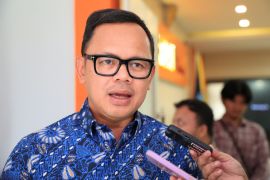"The amount of investment needed to develop cloud computing service will be adjusted to the business trend. If needed, we will increase the investment," Telkom IT Solution and Strategic Director Indra Utoyo said following a seminar on "Cloud Goes Mobile, Are U Ready?," here on Wednesday.
Cloud computing is technology that uses the internet and central remote servers to maintain data and applications. It allows consumers and businesses to use applications without installation and access their personal files at any computer with internet access.
Utoyo said a number of small-and medium-sized businesses and cooperatives had subscribed to cloud computing service since it was launched early in June 2011, he said.
"Admittedly, we have set ourselves the target of marketing cloud computing service applications to enterprises, including government institutes through e-government program," he said.
But he stopped short of revealing the number of small and medium scale businesses and state-owned companies that had subscribed to Telkom`s cloud computing service.
He said Telkom would always develop cloud computing service to the business ecosystem such as banks, manufacturing companies, hospitals and cooperatives.
"To date, the small and medium business and banking sectors lead the use of cloud computing with BPR-1 applications introduced in 2010," he said.
He added cloud solution was mostly applied to the Enterprises Resources Planning (ERP), Customer Relationship Management (CRM), and horizontal applications.
He said cloud computing service was divided into Software as a Service (SaaS), Platform as a Service (PaaS) and Infrastructure as a Service (IaaS).
"We have all the platforms adjusted to users` need," he said.
He predicted that the value of cloud computing business in Indonesia would increase in two to three years` time, along with companies` increasing demand for internet access.
(S012/B003)
Editor: Suryanto
Copyright © ANTARA 2012











